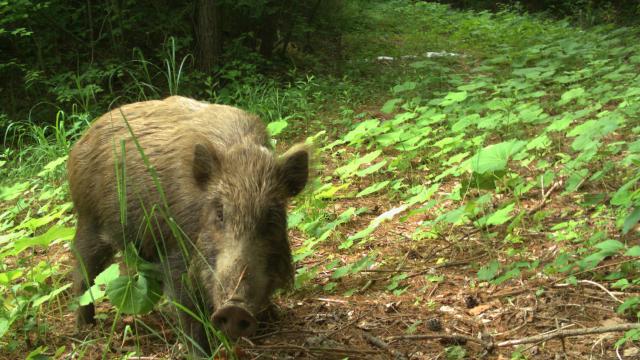The success of wildlife in the Chernobyl exclusion zone has been well documented, most recently in the Netflix series Our Planet. New research shows that wildlife are experiencing a similar flourishing in the Fukushima exclusion zone in Japan. No matter how much humans screw up the planet, nature seems to find a way to rebound once we get out of the way.
In 2011, an earthquake and subsequent tsunami caused Fukushima’s nuclear plant to melt down and led the Japanese government to evacuate an area roughly the size of Los Angeles as radiation spread over the region. That area was eventually broken down into three zones: one where people can return to live, one where some areas are safe to live, and another restricted zone unsafe for human habitation due to high levels of radiation.
That breakdown has helped structure human life in the aftermath of the disaster, but it also gave researchers an unprecedented chance to look at how wildlife responded to shifts in human habitation and radiation. Much of the work on how Fukushima’s radiation has affected animals has focused on individuals or small groups and has largely looked at molecular impacts of radiation. But the new study released on Monday in Frontiers in Ecology and the Environment looked at the population level of wildlife by setting up 120 camera traps around the three zones.
In the end, 14 cameras failed, but the researchers still collected more than 267,000 images over two 60-day periods. That allowed for an unprecedented view of the animals roaming the Fukushima countryside. The images they captured show the remarkable propensity of—to borrow a sentiment from Jeff Goldblum—life to find a way. A video with timelapses from some of the sites shows wild boar piglets (boarlets?) suckling, monkeys roaming, and a fox wandering by with a rabbit in its mouth.
The most commonly spotted creatures in any zone were wild boars (not to be confused with feral hogs); their population in the exclusion zone was double that of the zone where humans were restricted and three times that of the zone where humans live. In fact, most species had higher populations in the exclusion and human-restricted zones, all areas with higher radiation. The main exceptions are raccoon dogs and Japanese serow, a goat-like ungulate, which each had higher populations in the inhabited zone.
“Over time, some wildlife species have responded favourably to the absence of humans, even in the presence of high radiation levels, resulting in a rewilding of the evacuation zones,” Thomas Hinton, a radioecologist at the Institute of Environmental Radioactivity at Fukushima University who worked on the study, told Gizmodo.
It’s quite a commentary on humanity that animals would rather live with radioactivity than human activities, but there you have it. In all seriousness, though, the results show that wildlife are able to thrive in places where humans retreat. The study notes the camera trap data revealed no abnormalities at the population-level for any of the species studied, though other findings have shown Fukushima’s radiation has caused health effects, such as DNA damage in earthworms and reproductivity declines for goshawks.
Humans have put overwhelming pressure on animals around the world, from the Amazon, where fires are used to clear land, to Australia, where the climate crisis has fuelled a massive wave of death. These mounting pressures have put us at the start of the sixth mass extinction, with up to a million species at risk of going extinct due to human activities. That alone should give us pause for thought, let alone that the ripples of a catastrophic extinction will inevitably make life on Earth harder for us.
It’s never been clearer that we need to reserve space for wildlife, and rewilding the landscape is one route to do that. For Fukushima, it’s been an unintentional rewilding, but it shows what can happened in a relatively short time and hints that more planning could yield an even more successful rewilding program. We just need to get our act together and do it ASAP.
“Humans are nature’s cancer,” Hinton said. “Our ever-expanding presence has discernible impacts on many wildlife species. Nature, however, is resilient and if the stress of persistent human presence is reduced, many wildlife populations are about to rebound and increase in numbers.”
